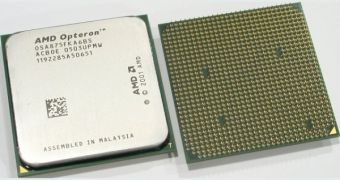Names and conventions are the only thing that keeps us from going mad with the avalanche of new products that are dropped on the market on a daily basis. Processors are not an exception to the rule, but it seems that the numbering system got a little mixed up, so I'd rather make things clear before you start smashing your head against the keyboard in confusion.
AMD's Phenom barely made it to the market, but failed in fighting back at Intel's processors during the benchmarks. However, the numbering system for AMD's Phenoms are dangerously similar to Intel's latest quad-core powerhorses: the 9000 series.
As if this wee is not enough, AMD said its triple-core Phenoms (the Tolimans, in fact) will be part of the 8000 series, which strikingly resembles Intel's 45-nanometer Wolfdale Core 2 Duo parts. Unless you're a tech geek, you will surely get lost in the naming system, where similar series hide extreme performance differences. What's most important, if you plan on buying a new system from a brick-and-mortar computer shop, then there's a high chance that the shop assistant will be as puzzled as you.
The previous naming system was extremely simple and was comprised of the processor's architecture (Intel Pentrium 4, or AMD Athlon) and a three or four-digit number, that unveiled the core clock speed. The bigger the number, the faster and more expensive the CPU. Things changed when AMD figured out that it was losing in that naming, since AMD's CPUs performed otherwise than Intel's chips. The equivalence number (1700+ for instance) let users know the clock speed of an AMD processor as compared to Intel's.
However, this seemed not to be a problem, since a Pentium 4 670 and an Athlon 64 3000+ cannot be mistaken easily, as well as you don't take an apple for a plum. Things get more complicated when you have to decide upon a Phenom 9500 or an Intel Core 2 Quad Q9450 processor for your own system. A less tech-savvy user could say that Intel's offering is overpriced and would provide the same performance as AMD's chip. However, Intel's quad core is running at 2.66GHz and would easily outpace the AMD's 2.2GHz one.
The similitude in naming two different breeds of processors is causing havoc, since they mislead users into thinking that they get the same thing at a cheaper price. But maybe AMD is counting on that "little" confusion in order to boost its sales.
You know what... forget it. If you plan to buy a new PC then you should consider bringing a tech friend with you.

 14 DAY TRIAL //
14 DAY TRIAL //